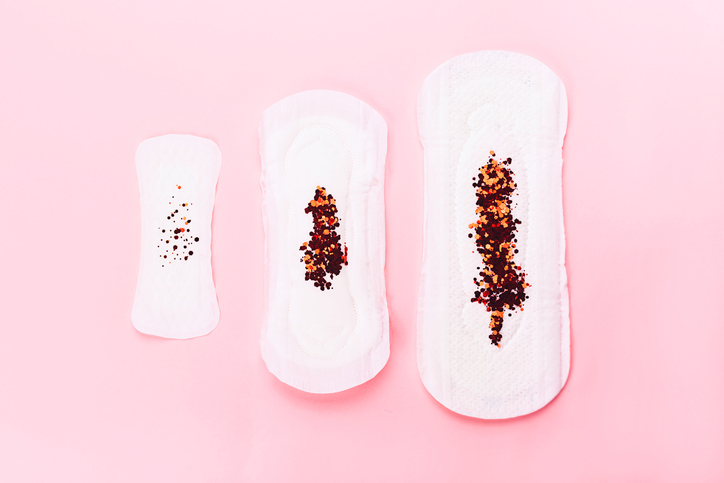Implantation Bleeding vs. Period: How to Tell the Difference

Light spotting can be perplexing, especially when you are trying to become pregnant. Sometimes, this type of bleeding simply signals the start of your menstrual cycle.
But light spotting can also be something called implantation bleeding: One of the first signs of pregnancy for about one in three women after conceiving.
While the difference between implantation bleeding and period blood is subtle, there are some ways to distinguish between the two and determine whether medical attention is needed.
Related: What Does Vaginal Bleeding Mean During Pregnancy?
What’s the Difference Between Spotting and Implantation Bleeding?
The main difference between implantation bleeding and period bleeding is that the former can occur when a fertilized egg attaches itself to the uterine wall, whereas menstrual cycle bleeding occurs when ovulation has come and gone and your body has not detected a pregnancy.
When your brain receives the signal that prenatal preparations are no longer needed, the thickened lining of the uterus sheds, producing your period.
Implantation bleeding can be confusing and easy to miss, especially if you are not actively trying to become pregnant. It typically happens 10-14 days after an egg is fertilized, around the same time your menstrual cycle would begin. With implantation bleeding, you might also feel some cramping that feels similar to mild menstrual pain.
These symptoms of implantation bleeding can fool many people into thinking they are experiencing period bleeding, so they do not notice that first missed period. However, unlike menstrual bleeding, which can last four to seven days, implantation bleeding usually lasts only a day or two.
Period Blood is More Red That Implantation Bleeding

Another distinguishing factor between implantation bleeding vs period bleeding is the color of the blood itself. According to the American Pregnancy Association, period blood tends to be a bright to dark red, while implantation bleeding will likely take on a light pink to dark brown hue.
Implantation Bleeding is Lighter Than a Normal Period
The amount of blood will be different as well. Implantation bleeding is typically too light to warrant the use of a tampon. When the egg attaches and burrows into the wall, some uterine lining may shed and cause this light bleeding, whereas women generally will bleed enough to fill a pad or tampon during their period.
What Are Positive Signs of Implantation?
Regarding implantation bleeding vs period bleeding, the former will typically only emerge a few times a day and should be light enough to appear as a few spots on your underwear or a liner.
According to Banner Health, menstrual bleeding will range from light to heavy bleeding over several days or weeks, while implantation bleeding often lasts only a few days. It’s likely that you will only notice spotting from implantation bleeding when you wipe after using the toilet. With your period, the bleeding typically starts light and gets progressively heavier — and far more noticeable.
Blood clots are also a telltale signal for period blood since implantation bleeding will not produce this combination of blood and tissue. According to Healthline, if you notice clots in your blood, you can be “pretty sure” that this is your period and not implantation bleeding. Additionally, cramps are generally short-lived with implantation blood but can carry on through the length of your menstrual cycle.
Still not sure whether you’re experiencing pregnancy spotting vs period spotting? Here are some other signs of early pregnancy:
- Mood swings.
- Changes in appetite.
- Darkening of the skin around your nipples.
- Headaches.
- Nausea.
- Digestive issues, such as constipation.
- Increased urination.
- Breast tenderness.
- Mild uterine cramping.
- Fatigue
Will a Pregnancy Test Be Positive During Implantation Bleeding?
Only one-third of pregnant women experience implantation bleeding, so it is not a guaranteed sign of pregnancy. That said, a pregnancy test can be positive during implantation bleeding.
If your normal menstrual cycle doesn’t start within a few days of noticing the spotting, it’s worthwhile to take a home pregnancy test to determine what’s going on. If you’re someone with less regular periods, it can be beneficial to wait at least three weeks after intercourse to take a pregnancy test.
Waiting to test allows the pregnancy hormone human chorionic gonadotropin (hCG) to accumulate in your body. According to the Cleveland Clinic, hCG is a hormone that is produced by the placenta during pregnancy.

hCG is traceable in your urine or blood about 10 days after conception, and hCG levels are typically highest toward the end of your first trimester. The hCG hormone is known to increase rapidly — almost doubling every few days — and higher levels may aid the accuracy of a home pregnancy test.
However, some over-the-counter pregnancy tests are so sensitive they can detect hCG before the first day of your missed period. If you can’t differentiate between pregnancy spotting vs period blood and are getting negative results on your tests, it’s a good time to contact your doctor or midwife. They may recommend waiting and testing for hCG again at home, or they may recommend a blood test.
While getting a false negative is rare, it can and does happen, so if you truly believe you are pregnant, it is better to be safe than sorry and call your healthcare provider. If you have a positive pregnancy test.
The next step is to call your healthcare provider or OB-GYN and begin taking prenatal vitamins if you are not already doing so. Your doctor will determine your due date based on the first day of your most recent menstrual cycle.
What Are Some Causes of Spotting During Pregnancy?
Once puberty hits, vaginal bleeding is a regular occurrence for teens and women; however, there are a few warning signs that the bleeding is not your standard menstrual period or implantation bleeding.
Some unfortunate and possibly dangerous causes of bleeding are threatened miscarriage, pregnancy loss or ectopic pregnancy:
Threatened miscarriage
Bleeding in early pregnancy may be a sign of a higher risk of miscarrying during the first trimester. Signs of a threatened miscarriage include bleeding from the cervix, vagina or uterus combined with belly pain or cramping.
According to the Cleveland Clinic, threatened miscarriages occur in the first half (up to 20 weeks) of pregnancy, but most commonly occur in the first trimester (13 weeks) of pregnancy, with the length of the event ranging from several days to several weeks.
If your healthcare provider suspects you are at risk, they will order blood tests or an ultrasound scan. Fetuses can survive a threatened miscarriage, and your healthcare provider may recommend resting for a set period of time until the threat of a miscarriage passes.
Pregnancy loss
Pregnancy loss or miscarriage can sometimes be indicated by bleeding, especially if it is heavy bleeding or clots and clumps combined with lower belly cramps. Another possible sign of a miscarriage is foul-smelling discharge from your vagina.
According to the Department of Obstetrics and Gynecology at the University of California, Davis, fever, abdominal pain, bleeding and pungent discharge can signal a septic miscarriage:
Pregnancy loss triggered by an infection in the uterus. The American College of Obstetricians and Gynecologists (ACOG) estimates that 26% of pregnancies end in miscarriage. Only 10% of these pregnancies are clinically recognized, however, which means many people miscarry before realizing they are pregnant and assume the bleeding is part of their normal period.
While the Cleveland Clinic cites immune disorders, unmanaged diabetes, hormonal imbalances, age and severe malnutrition as some factors for pregnancy loss, it also acknowledges that “Most miscarriages have nothing to do with something you did or didn’t do.”
Ectopic pregnancy
Ectopic pregnancy is a potentially life-threatening condition that occurs when a fertilized egg implants itself outside of the uterus. This usually occurs in the fallopian tube, however, it can also occur in the ovaries, abdominal cavity or cervix. When an ectopic pregnancy occurs, people can experience many typical symptoms of pregnancy and will also receive a positive result on a home pregnancy test.
According to the Mayo Clinic, early signs of an ectopic pregnancy are light bleeding and cramping or the urge to have a bowel movement. If left untreated, ectopic pregnancy can cause death to the mother. Emergency signs include:
- Severe abdominal or pelvic pain, especially on one side
- Vaginal bleeding
- Extreme lightheadedness or fainting
- Shoulder pain
If you know you are pregnant and are experiencing any of these signs, please contact your OB-GYN immediately. While many people who experience bleeding during the first trimester go on to have a healthy pregnancy, it is always wise to get checked out to ensure both you and your baby are safe.

